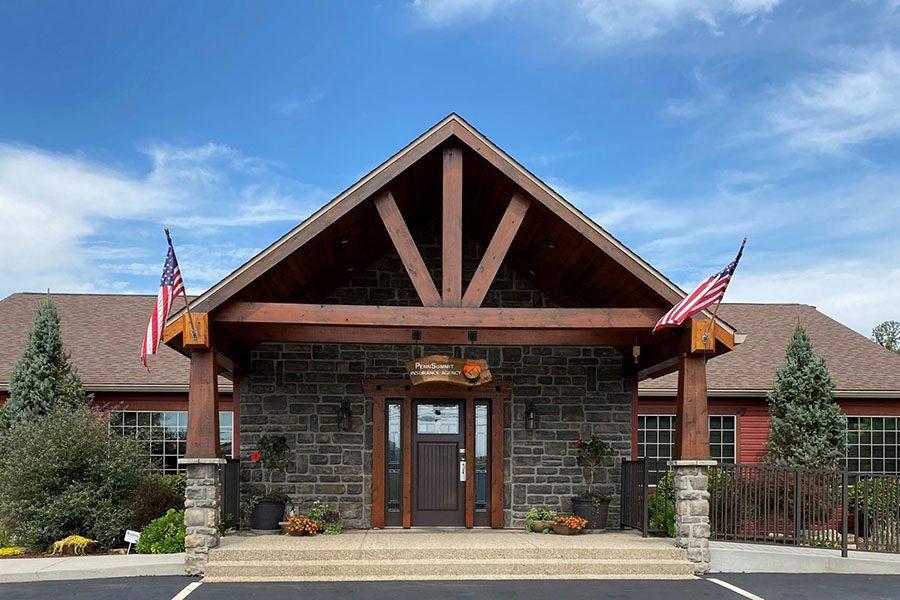When You Think Insurance, Think Penn Summit
Get Your Insurance Quote
As an independent agency, we are here to help you find the right coverage.

The Advantage of an Independent Agency Working for You
- We represent multiple insurance companies.
- We are licensed insurance advisors.
- We are by your side every step of the way.
- We offer a wide variety of insurance solutions.
- We are there for you in your time of need.
Penn Summit Insurance Agency LLC
Your hometown insurance agency.
Penn Summit Insurance Agency has quickly become the agency of choice for many types of insurance. Built upon excellence and quality of service, we provide the same integrity as past generations and the personal interaction of the current generation.
As an independent insurance agency with access to a variety of coverage options to bring you value when it comes to price, policy, and service. Above all else, we take pride in putting your needs first, while serving you with honesty and integrity. By taking a service-oriented approach to insurance, we go the extra mile to help you find coverage and peace of mind. Because protecting what matters most to you is what we’re here for. Read more about us!
Not Your Average Insurance
We know our stuff when it comes to personal insurance, business insurance, and employee benefits. From start to finish, you’ll get a unique insurance experience every step of the way.
Personal Insurance
Trusted advice and insurance solutions to protect what matters most.
Business Insurance
Coverage and risk management solutions for companies of all sizes.
Employee Benefits
Coverage that can help attract, retain, and protect your team.
Our Clients Love Us
Check out our reviews and see why you should switch to Penn Summit Insurance Agency LLC.
Real clients. Real reviews. Real coverage.
“I’m so glad I found you guys. You are like a dream come true. Anytime I needed anything you guys were on it! I love to work with people like that! “
– Dan, Chase Trucking LLC
Coverage Where It Counts
Whether you’re local or not, you’ll get the same great service and insurance from a team that cares about you. Based in the mountains of Southwestern Pennsylvania in Chalk Hill, PA, stop by or get in touch with us today!
We Think Outside the Box
You won’t find the same old approach to insurance here. With us, we do insurance differently.
All-Woman Team
We’re more than just agents, we’re a team of knowledgable, strong women who know insurance and love what we do.
Available Anytime
We know insurance questions or claims don’t always come up during business hours. Get in touch when you need us!
Fun and Friendly
The same old is boring. We make insurance fun and our team can’t help but be friendly—it’s just who we are.
Trusted Relationships
We love getting to know you! We want to be your friend, not just your agent, so you can have someone you know and trust by your side.
Hometown Agency
We’re your hometown agency, and you’ll get the same local, personalized service whether you live down the street or in another state.
Click it. Read it. Cover it.
Get a glimpse of the risks you face and how your insurance can protect what matters most.

The type of trucking insurance you need can vary based on a number of factors. Private carriers who are hauling goods in their own truck or for an employer will need insurance designed for private trucking. Owner-operators will have different needs depending on whether they are operating under their own authority or under permanent lease to a motor carrier.
Having the right insurance for the situation is essential. For example, an owner-operator under permanent lease to a motor carrier may have their primary liability insurance provided by the motor carrier. However, there are other coverages they’ll want to consider. Additionally, the type of truck, driver experience, and goods hauled can all affect coverage needs as well.
Tow trucks carry a unique risk involving the property of someone else. The tow truck could be involved in an accident and the vehicle it is towing could become damaged. Also, it’s not unusual for a towed vehicle to be stored overnight at the garage of the towing company. In either scenario, special insurance is needed to cover the towed vehicle.
On-hook insurance provides protection in the case of damages to a vehicle while it is being towed. Garagekeepers insurance would cover losses sustained when a vehicle is being temporarily stored at the towing company’s location.
Sometimes a truck is driven without a trailer attached. This could include when the driver is on their way to pick up a load, has just dropped off a load, or is in between loads. When a truck is driven this way under someone else’s trucking authority, a coverage gap can exist if the truck is involved in an accident and found liable for bodily injury or damage to property.
Bobtail insurance is a liability policy that provides coverage for legal fees, damages awarded, and medical expenses for times when a truck is driven under someone else’s trucking authority and there is no trailer attached.
Trucks that are under permanent lease to a motor carrier are typically covered under their liability coverage, which offers protection when the truck is used for business purposes. But what happens if the truck is involved in an accident and is liable for damages caused while being driven for non-business purposes?
Non-trucking liability insurance offers protection when a truck is driven for personal reasons, for example while running personal errands on a day off. It covers medical expenses, property damage, and legal fees related to the driver.
There are times a trailer needs to be handed off from one trucker to another to finish the shipment. The contract that arranges this transfer is known as a trailer interchange agreement. The parties to this agreement would need trailer interchange insurance.
If a trailer is damaged, the trucker currently in possession of it would be responsible for them. Trailer interchange insurance offers protection for these damages for the period of time the policyholder is in possession of the trailer.
A truck that’s been damaged in an accident will need to be taken off the road for repairs. When the truck can’t be used, the business will lose money.
Rental reimbursement with downtime may cover the cost of truck payments and other bills while the truck is inoperable due to a covered loss. It may also provide reimbursement for a temporary replacement truck.
Owner-operators under their own authority and motor carriers can find themselves responsible for their mistakes. A customer injury, a delivery mistake or damage to goods, or damage to property caused by their truck or the actions of a driver can all be very costly.
Motor truck general liability insurance may provide coverage for bodily injury and property damage, personal or advertising injury, and other damages caused by the company’s own negligence.
For-hire truckers are often hauling something for someone. For the time that the freight or goods are in the possession of the trucker, the trucker is responsible for any damage to the goods. Whether the goods are damaged in a collision, are spilled off the truck, or damaged during loading and unloading, the expenses associated with this damage can add up fast.
Motor truck cargo insurance, sometimes simply referred to as cargo insurance, may cover the cost of the damaged cargo, removal expenses if the cargo is spilled, lost cargo, legal fees, and freight charges if the cargo is not delivered.
If a truck is damaged in an accident and another driver is not held liable for these damages, the truck’s owner would be responsible for the repairs. The truck’s owner would also be responsible for damages caused in other ways, such as if something falls on it, it is vandalized, it catches fire, or it is stolen.
Physical damage insurance covers the cost of repairs to your own vehicle if it’s damaged by you or it is damaged by some other factor that you cannot be held responsible for. For vehicles that are owned outright, this coverage may be optional. However, if the truck is being leased or financed, this coverage may be required by the bank.
Trucking Insurance 101
Make sure you cover the unique risks you face with trucking insurance.
- Click on the hotspots.
- Discover your risks.
- Get the right coverage.
Not what you’re looking for?
Find even more interactive graphics for home insurance, auto insurance, and life insurance.
